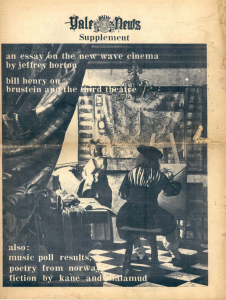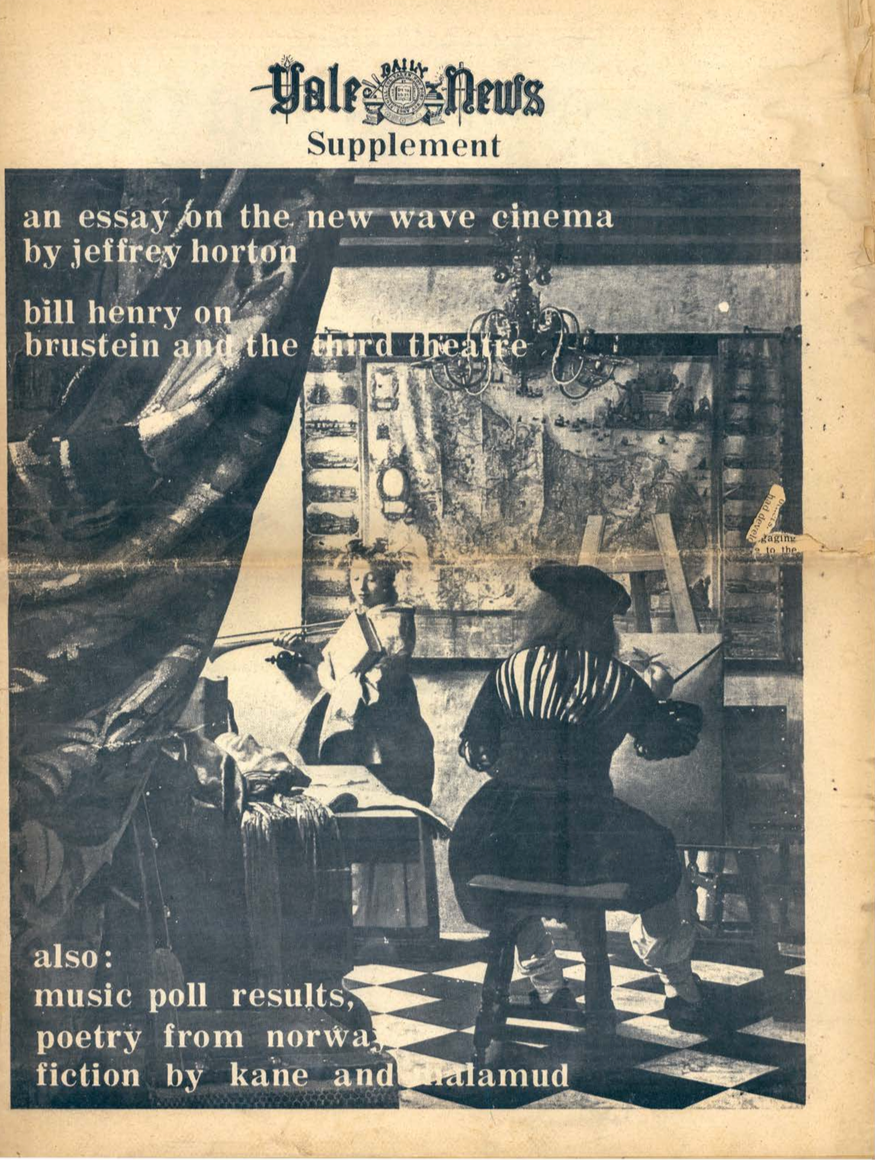Seeds of Our Future Accomplishments, or Not

As a webmaster for Yale1969.org, I have enjoyed receiving and preserving printed artifacts of our time at Yale. (See “Calling All Packrats” and my appeal to you to send more!)
The most compelling artifacts for me are those that show off our creative, artistic, reportorial, analytical and critical expressions.
In this addition to the Yale 1969 Archives, I have scanned, processed and now re-published a Supplement to the Yale Daily News, which was originally published on May 14, 1969. I suspect that, owing to its being published so close to our graduation date, many people in our class may have never seen it before. Believe me, it’s worth reading!
I’ll add technical details of my archiving work below[1], but the end result is a 50-year-old newsprint document that can actually be read and reflected upon. Those reflections have led me to understand how impressively talented and nieve we were while undergrads.
In reading these articles by classmates, I am struck by how we were all testing ourselves to see what we liked to do, what was easy for us, and where we showed talent. But equally important were the failures, mistakes, and missed deadlines that showed us the areas where we were unlikely to achieve greatness — or even adequacy.
The focus of this Yale Daily News supplement is the Arts — both original prose and poetry, as well as analysis and criticism of the Arts.
Among the articles are:
- New Waves and Old: French Film and Popular American Cinema, an essay by Jeffrey Horton.
- Brustein’s Third Theater: The repertory year in review, a critique by William Henry III, at the time, a Yale sophomore when we were seniors. He went on to receive several Pulitzer Prizes before his untimely death.[2]
- Music and the Yale Man, the results of a poll taken on music preferences in Yale College.
- The Visual Arts at Yale: A Sampling, a set of drawings, paintings, sculpture and photographs by a variety of artists, including Garry Trudeau, Thomas Mairs, Stephen Elston, Marty Mugar, Buzz Yodell, Jorge Garcia-Rodriguez, Thomas Arnold, Richard Smith (possibly our Richard Smith), and Thomas Reed — of which we have two — Thomas J. Reed and Thomas L. Reed — and I am sure they are still tired of the confusion.
- references, by John C. Kane, in 1969 a Yale College sophomore. His story, references, was one of the three which received mention in the 1969 Peter Wallace Short Story Contest.
- light show, by Paul Francis Malamud. After graduating from Yale in 1969, Paul Malamud went on to receive a PhD in Eighteenth Century British Literature from Columbia and then entered the U.S. Foreign Service, stationed in India. On return from India, he joined the U.S. Information Agency. Recently he has published two books of poetry and fiction.
- In A Note on the YALE ARTS FESTIVAL, there is an interesting piece from Garry Trudeau written in 1969 when he was a Yale junior. Among other things he says:
“My present work also includes a daily comic strip which perhaps years from now will take on new dimensions of humorous excitement when I learn to draw. Its uniqueness at this time probably rests largely on the device of looking for comedy in each frame of the strip, that is, Bulltales is the four-panel smile instead of the last panel laugh.
In the meantime, I will continue to take art courses so that I can get out of exams and into art school. Where I go from there is largely indeterminate, as I am presently considering the tempting options offered by the military-industrial complex”
I hope you enjoy reading a view of what we were thinking 50 years ago.
Download your copy of Supplement to the Yale Daily News here.
Notes:
[1] Technically, this involves photo scanning, processing the multiple photos so that newspaper pages have no frayed edges, so that faded pages are readable, converting the digitized page images into Page Description Format (PDF) documents and finally performing Optical Character Recognition on the PDFs so that we can search through them for names and topics we remember.
[2] From Wikipedia, “Henry graduated from Yale in 1971 and began his career in journalism in Boston, writing for the Boston Globe. His coverage of school desegregation in Boston won a (shared) Pulitzer Prize in 1975. He also wrote on the arts for the Globe, winning a second Pulitzer for his television criticism in 1980. In the 1980s he worked as an arts critic for Time magazine, while pursuing his interests in cultural criticism and in American politics. Among his notable works were his 1984 book, Visions of America, on the American presidential campaign of that year; his 1990 video documentary of Bob Fosse, Steam Heat, which won an Emmy; and his 1992 biography of Jackie Gleason, The Great One.His final, and perhaps most notable, book was In Defense of Elitism, a work of social and cultural criticism that argued that societies and cultures might be ranked on a spectrum ranging from ‘egalitarianism’ to ‘elitism’, and that the contemporary United States had moved too far away from the latter; a view he defended with reference to college education, multiculturalism, and other topics. He died of a heart attack on June 28, 1994 while the book was coming to press.


Hi Harry,
Thanks for all the document scanning, touchup and preservation work you’ve been doing in behalf of our Class. It adds a whole other dimension to our memories and is much appreciated. BTW, the “Cindy” portrait in the art section, was my creation. Sincerely, Thomas J. Reed
I was sure I had but cannot find a large format (fold out appx 11×17) picture from coeducational day at Yale.
It had a young (pretty) girl and (as I recall) a caption: “Please Mr. Brewster can I come to Yale?”
I hope you Harry or someone else has this classic from the last all male Yale. (Note I was in favor and my daughter went to Yale… While my son refused to apply and went to MIT. 😉 ) Terry Benson.
I putter and mutter: I know I had it here somewhere…